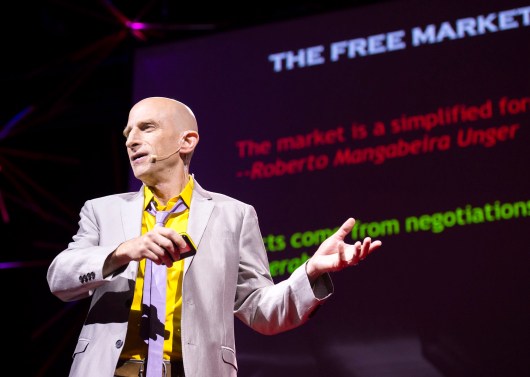“In System D, this is a store,” says Robert Neuwirth as he shows a photo of a woman sitting on a plank beside a canal in Makoko in Lagos, a booming shantytown built on stilts over the water. It’s a place where “there are no streets where there are stores to shop, and so the shop comes to you.” Another example of business synergy, global business and a business incubator? A garbage dump where local entrepreneurs congregate and create markets and services around reclaiming materials.
Neuwirth studies the informal economy. Not the illegal economy, but what he calls System D. It’s not a black market, but an open economic arena where anything is available. “There’s nothing underground about it; it’s our prejudgment that it’s underground.”
He shows a picture of Oshodi Market, in Lagos, which he calls the apotheosis of a street market. It’s a highway that is absolutely packed with stalls and vehicles selling everything imaginable. The problem, is that the government thought it was untidy, so it was removed.
The problem, says Neuwirth, is that “we are looking at the economy like we look at dill pickles.” We are looking for perfect ones coming down the conveyor belt, and feel the need to take bad ones off the line. “We’re all focused on the economy of luxury.” That economy is large, but there is a giant footnote by that number — it excludes two-thirds of the workers in the world. Those are the part of System D, the informal economy, which employs 1.8 billion people and is worth $10 trillion/year.
If System D was a country, you could call it the USSR: The United Street Seller’s Republic, it would be the second-largest economy in the world, and it is growing rapidly. It could become the largest in our lifetime.
Major corporations have recognized this. Some companies, such as UAC Foods, have started creating products that are only sold on the street. Western companies have started as well. For Procter & Gamble, Walmart is their biggest single buyer, but as a market segment, the tiny kiosks are bigger, and “it’s the only one that’s growing.” They don’t care about the legal status of the stores that sell their products, they want their products in the store.
In Nigeria, MTM came in with a mobile phone plan similar to those in other countries — sell phones and a subscription plan — which crashed and burned. So they came up with new plan. You get a SIM card and you buy air time — air time that is sold in umbrella stands, in System D. They rode that to a 45% market share. The mobiles themselves come from China — they’re extremely cheap, smuggled in, and sold on the street.
Is there a downside to that kind of piracy? Of course. But there are real benefits too. Neuwirth talks to a sneaker manufacturer who told him he thinks of piracy of market research: If theirs are not pirated, they conclude they’re not making the right sneaker.
Neuwirth closes by wondering what would have happend if Adam Smith had written about the Flea Market instead of the Free Market. He lists three principles of the Flea Market:
- Trade is a form of cooperative. “The market is a simplified form of cooperation among strangers” ~Roberto Mangabeira Unger.
- Facts are relative. “Facts come from negotiations between different parties” ~Paul Feyerabend.
- There are alternate currencies. “When can i go into the supermarket and buy what i need with my good looks?” Allen Ginsberg.
For more, watch Robert Neuwirth’s previous TEDTalk, on “Shadow Cities” >>
Photo: James Duncan Davidson

Comments (7)
Pingback: Economics Assignments Solutions – TP Study Club
Pingback: Underground economy | TURNING POINT E-LIBRARY
Pingback: La magnitud de las transacciones de la economía informal en el Perú es de alrededor de 60% del PBI « Blog de Franco
Pingback: Robert Neuwirth: The power of the informal economy « Alex's space
Pingback: Paul Karl Feyerabend | Seit über 10.000 Jahren Erfahrung in Versklavung